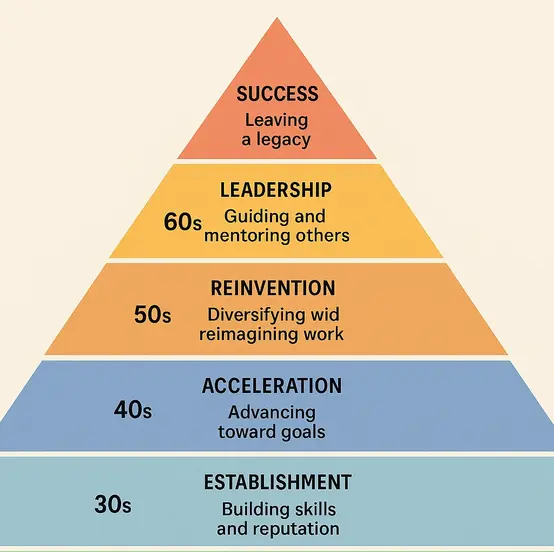Success Has Seasons — Not Deadlines
We’re told to chase promotions, higher pay, and better titles as fast as possible. But real career success doesn’t come from speed — it comes from alignment. It’s about knowing what to focus on at each stage of life.
From your 20s to your 60s, your goals, strengths, and priorities evolve. Yet many professionals treat every decade the same — hustling endlessly without adjusting their strategy.
Inspired by timeless career wisdom, this roadmap breaks your professional journey into six stages — each designed to help you grow with purpose, balance, and long-term fulfillment.
Stage 1: Age 20–30 — Find a Great Boss, Not Just a Great Company
In your 20s, success isn’t about how much you earn — it’s about how much you learn.
Many graduates make the mistake of chasing brand names or high salaries right away. But the smartest move you can make early on is to find a great mentor — someone who challenges you, teaches you how to think, and helps you navigate mistakes.
Your boss in this decade can shape your entire career philosophy. A great leader will expose you to strategy, decision-making, and leadership — lessons that will serve you for decades.
Key goals in your 20s:
- Work under leaders you admire — not just companies that look good on paper.
- Say “yes” to projects that push you out of your comfort zone.
- Focus on building foundational skills like communication, teamwork, and adaptability.
💬 “Your 20s are for learning. Your 30s are for earning.”
— Jack Ma
At this stage, curiosity is your greatest advantage. Learn broadly, fail fast, and absorb as much as you can.
Stage 2: Age 30–40 — Take Risks and Build Something of Your Own
By your 30s, you’ve learned the rules — now it’s time to challenge them.
This is your decade of experimentation. You’ve gained enough experience to stand on your own two feet, but you still have the energy and flexibility to take risks.
That risk could look different for everyone:
- Launching a business or side venture.
- Taking on a leadership role in a growing company.
- Changing industries to pursue something more meaningful.
Many professionals fear losing stability during this stage, but stagnation is a far greater risk than failure. You’ll never know your potential until you bet on yourself.
Key goals in your 30s:
- Shift from learning to creating.
- Start developing your personal brand and professional network.
- Focus on building multiple streams of experience, not just income.
💡 Pro tip: “Don’t wait for the perfect opportunity. The best opportunities are rarely labeled as such when they arrive.”
Stage 3: Age 40–50 — Master What You Do Best
Your 40s are the decade of focus and mastery.
By now, you’ve accumulated two decades of experience. You know what you’re great at — and what drains your energy. This is the time to specialize. Instead of chasing everything, double down on the areas where you can deliver maximum value.
Professionals in this stage often step into executive roles, consulting, or entrepreneurial ventures where their expertise becomes their most valuable currency.
This is also the time to solidify your personal and professional reputation. People trust you for results — so deliver with precision and consistency.
Key goals in your 40s:
- Build depth over breadth — focus on high-impact skills.
- Strengthen your professional network and reputation.
- Begin mentoring others to extend your influence.
🧭 Mindset shift: Move from “career growth” to “career refinement.”
Stage 4: Age 50–60 — Invest in the Next Generation
By your 50s, success means legacy. You’ve achieved professional stability — now your goal is to multiply impact through others.
Mentorship, teaching, and leadership succession become essential. Whether you’re running a business or leading a department, this is the stage to nurture future leaders and transfer your knowledge.
Many professionals in their 50s find fulfillment through coaching, consulting, or advising startups. They use decades of experience to help others avoid mistakes and make better decisions.
Key goals in your 50s:
- Become a mentor — inside and outside your organization.
- Start positioning yourself as a thought leader or industry advisor.
- Focus on impact, not just income.
💬 “Great leaders don’t just build companies — they build people who can build companies.”
Stage 5: Age 60+ — Balance, Legacy, and Meaning
After four decades of contribution, your focus naturally shifts from achievement to enjoyment.
You’ve earned the right to slow down — but that doesn’t mean you have to stop. Many professionals in this stage stay active through advisory roles, board memberships, or passion projects that keep them intellectually engaged.
It’s also a time to reconnect with family, health, and personal interests that may have taken a backseat during your busiest years.
Your career legacy — the teams you built, the people you mentored, the knowledge you shared — becomes your lasting impact.
Key goals in your 60s:
- Prioritize health, family, and mental well-being.
- Focus on legacy projects or causes that matter deeply to you.
- Celebrate your achievements — and share the lessons that got you there.
💡 “Work becomes optional. Purpose doesn’t.”
The Career Roadmap: How to Apply This in the U.S. Job Market
In the modern American workplace, career paths aren’t linear anymore. People switch industries, embrace remote work, and balance side hustles with full-time jobs.
But this roadmap still applies — because it’s not about titles or timelines; it’s about intentional growth.
Here’s how to make it practical:
- Audit your current stage. Identify whether you’re learning, building, mastering, or mentoring.
- Align your goals with your life phase. Don’t chase what worked for someone else — focus on what fits your priorities today.
- Invest in learning continuously. The U.S. job market rewards adaptability — from AI skills to leadership communication.
- Revisit your roadmap every 5 years. Your definition of success will evolve — and your strategy should too.
When you think in decades, not deadlines, you build a career that’s resilient, rewarding, and relevant
Final Thought: Define Success by Season, Not by Speed
Careers are marathons with multiple seasons — each with its own pace and purpose.
Your 20s are for learning.
Your 30s are for building.
Your 40s are for mastering.
Your 50s are for mentoring.
Your 60s are for meaning.
When you understand which season you’re in — and act accordingly — your career stops being a race and becomes a life-long story of growth, contribution, and fulfillment.






